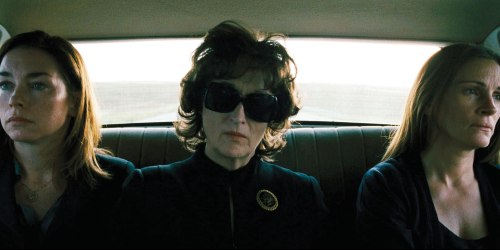
Julianne Nicholson, Meryl Streep, and Julia Roberts bring the somber in August: Osage County. (Photo credit)
It’s right about now that I can be found frantically trying to catch up on all of the year’s best movies. Usually around the end of January I realize I have seen very little of note and am scrambling to fill in the blanks come Oscar season. With Meryl Streep and Julia Roberts earning Globe, SAG and Oscar nominations for their roles, August: Osage County was high on my awards-season must-see list.
From the very first tense, dimly lit scene, August: Osage County presents the audience with a picture of rural family life in middle America that is strained, bitter, and unsettling. It’s an intimate, up-close and personal, no-holds barred invitation to enter into what most of us would consider a deeply dysfunctional home. Streep plays the terminally ill substance abusing matriarch who uses truth as a blunt weapon against her troubled daughters. Her husband’s disappearance (Sam Shepard) serves as the catalyst for a reluctant family reunion in Oklahoma’s sweltering late August heat. Enter long-suffering and bitter eldest daughter (Julia Roberts) with husband (Ewan McGregor) and daughter (Abigail Breslin); the quietly resigned “spinster” daughter who stayed close to home (Julianne Nicholson); and the free-spirit wild child (Juliette Lewis) towing her smarmy rich fiancée (Dermot Mulroney).
As if that cast of characters wasn’t enough for an uncomfortable family melodrama, my favourite performances in the movie are given by Margo Martindale (Streep’s character’s sister) and Chris Cooper as her husband. They don’t get much screen time and are somewhat overshadowed by the “meatier” roles, but demonstrate brilliant nuance and depth in every single moment. Similarly, Benedict Cumberbatch (known to many as BBC’s Sherlock) gives an understated performance of quiet desperation that is somehow both endearing and excruciating.
August: Osage County is all about the acting. There’s lots of over-the-top melodrama and heavy relational content punctuated with cruelly dark humour. The plot reminds me of a Tennessee Williams play – intense bourbon-soaked southern angst. Based on Tracey Letts’ award-winning play, the cinematic version of August: Osage County reflects its stage origins – set primarily in one location, character driven, and at times brutally intimate, like you have a front row seat to the most screwed up family dinner ever (and just want to hide under the table).

Worst. Family. Dinner. Ever. (Photo credit)
Yes, there was lots in August: Osage County itself that left me feeling uncomfortable, but I think what is on my mind long after watching the film is the audience’s reaction. I saw this movie with a friend at an early weekend matinee. The theater was about half full – a decent crowd, but not packed. As I’ve mentioned, there are some darkly funny moments in the dialogue-heavy film and I laughed out loud a number of times at the biting wit and sarcastic comebacks. However, there’s a point at which the exchanges and arguments turn viciously nasty. Like pull-no-punches, in-your-face cruel. And it happens in a split second – one moment sharply funny, the next line severely hurtful. Most of the audience kept laughing as the scenes got progressively more tense and hostile. What’s that about?
Of course, there’s a tendency for us as human beings to laugh when we’re uncomfortable. Who among us hasn’t cracked a joke in heightened emotional circumstances? As an attempt to diffuse the tension… as a coping strategy… as a form of emotional release… or maybe cruelty has become so normalized that we’ve come to view intense conflict between people as hilarious. It probably goes without saying, but awkwardness is funny – Ricky Gervais has made a very lucrative career banking on that one human truth. Fighting itself can even be a bit ridiculous. But usually, you can feel the moment where good-natured teasing goes a little too far, or when a well-timed barb hits just a little too close to home. I guess maybe that’s part of the discomfort of August: Osage County – it’s about the lines we cross with other people (especially family) and either not knowing or not caring that we’ve gone too far.
I can’t say the constant and, in my opinion, inappropriate laughter throughout the film interfered with my experience of watching it, but it did at one point occur to me to stand up and ask, “What’s happening here? This isn’t funny.” Maybe my fellow movie-watchers needed it to be funny to be tolerable. Maybe I’m just way too uptight. Maybe I just don’t get meanness and vicious criticism as a source of comedy (although the art of sarcasm is not lost on me, not one little bit). Maybe I should just invest in a Netflix subscription and stop going to theaters. The fact remains that August: Osage County puts on agonizing display the worst ways people treat one another. I found it uncomfortable to watch. I found it more uncomfortable to laugh.

Very nice write-up. There have been a wide range of reactions to this picture. I lean more to the negative side. This was a hard movie to watch for me and not just for the dysfunctional avalanche that we see. I never saw any variations in the characters. It was as if the movie never gave us anything different. It never pulled the reins and by the end I just wanted it to be over.
Still I do see where people would respond favorably to it, but it just didn’t work for me. I think I gave it 2 stars.
Thanks for your comments, Keith. You make a very good point – makes sense that a big part of the “discomfort” of the film is that for the duration, things happen, but nothing and no one really changes. Sort of painful and depressing when you think about it. I’ll have to check out your review. Thanks so much for stopping by!